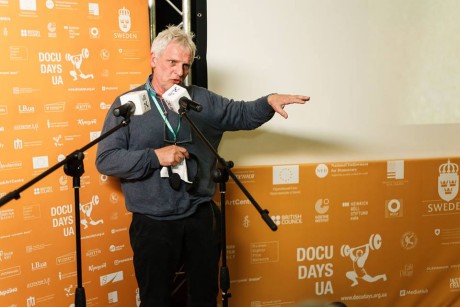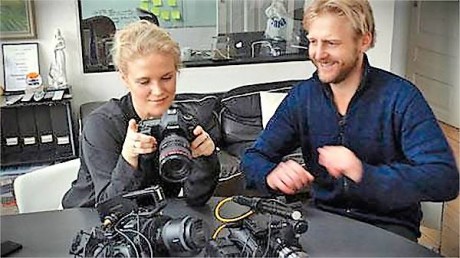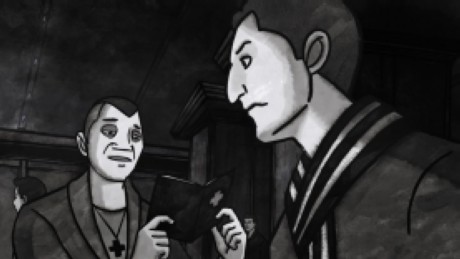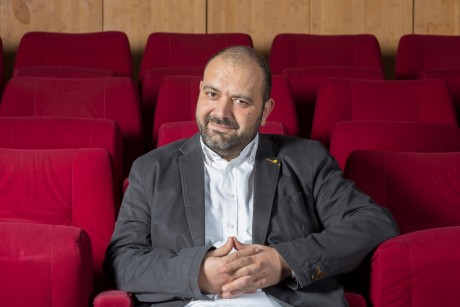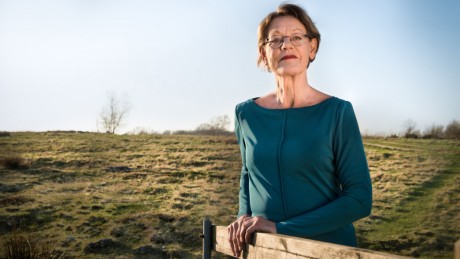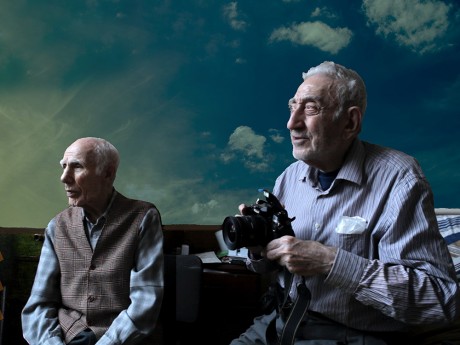I går modtog instruktørerne Mira Jargil og Christian Sønderby Jepsen årets Roos Pris for deres bidrag til dansk dokumentarfilm med denne begrundelse:
”For instruktørerne Mira Jargil og Christian Sønderby Jepsen ligger stoffet til deres fortællinger lige for. Det er i de små begivenheder og nære relationer, at de mesterligt udfolder universelle historier om livet, kærligheden og kampen for at leve det liv, man ønsker.
I ’Side om side’ af Sønderby Jepsen har to gamle naboer – den ene instruktørens far – ikke talt sammen i en halv menneskealder, uden at de helt kan huske, hvorfor de er uvenner. Men det piner dem, kan man mærke, noget må ske! Jargils ‘Den tid vi har’ følger ægteparret Ruth og Arne – instruktørens bedsteforældre – i deres sidste tid sammen. Ruth er døende, og Arne hjælper hende gennem den sidste tid.
Disse to tidlige værker lægger tydelige spor ud til det, der skal blive de to instruktørers signaturer i de mange film, der har berørt og underholdt os sidenhen:
Det er karakterdrevne fortællinger, der formår at forene en insisterende dvælen i de mest intime og sårbare situationer med en dramaturgisk stramhed og et visuelt overskud, der ikke lader Hollywood og Netflix noget efter.
Når Jargil og Sønderby Jepsen vælger deres hovedkarakterer, gør de det ikke let for sig selv. Det kan være helt almindelige gamle mennesker i en jysk provins i ’Til døden os skiller’, eller det kan være en ung mand med cerebral parese og talebesvær, der i ‘Naturens uorden’ stiller sig det mest hårrejsende spørgsmål af alle: Har jeg ret til at leve?
Det er eksistensen sat på højkant, og det er sådan, det er i Jargils og Sønderby Jepsens film. De opsøger mennesker i eksistentielle dilemmaer og skildrer dem så tæt på og med så stor autenticitet, respekt og værdighed, at vi som publikum følger dem på hele rejsen og deler deres ømhed og forundring over tilværelsens mangfoldighed og menneskets opfindsomhed og evne til at møde livets store udfordringer.”
https://www.dfi.dk/nyheder/roos-pris-2018-til-mira-jargil-og-christian-sonderby-jepsen
Vi på FILMKOMMENTAREN ønsker hjerteligt tillykke. Og vi gør det her med en lille citatsamling fra hvad vi her på siden gennem en række år har skrevet om Mira Jargils og Christian Sønderby Jepsens film:
DET SIDSTE DØGN (Mira Jargil 2005)
Mira Jargils film skildrer dette sidste døgn i et hus et ældre ægtepar efter mange år må forlade. På otte minutter. I en kort række minimale scener, hver scene med minimalt indhold. Ser det ud til. Men en række eksistentielle dramaer sættes i gang og føres igennem. Parallelt… Så meget eksistentielt på færde, så lidt udstyr scenografisk, fotografisk, tekstligt, musikalsk. Mira Jargils film er et studie i, hvor lidt man kan nøjes med. Filmen er en afslutningens koreografi, en skildring af dette uafvendelige, som både dramaet og livet dynamisk, men i faldende takt – tøvende så at sige – peger hen mod…
SIDE BY SIDE (Christian Sønderby Jepsen 2008)
The film is brilliant to look at, the mise-en-scène style is carried through, a promising debut, that reminds me of the early films of Jon Bang Carlsen…
TERRORIST VED ET TILFÆLDE (Christian Sønderby Jepsen og Miki Mistrati 2009)
… endelig fik jeg mulighed for at se Mistratis og Sønderby Jepsens film, som jo har været der længe: Terrorist ved et tilfælde, 2009 og Dømt for terror, 2010. På 2009-filmen er Christian Sønderby Jepsen medinstruktør. De to film har gjort indtryk, og de har sat tanker igang. For mig på nye måder. Det er alvoren og det daglige journalistiske arbejde, jeg er blevet optaget af. Den ligetil og usentimentale vilje til en efterhånden generel sammenfatning af en voksende mistanke til vores retsstat. Og så det, at det personlige er til stede så absolut nødvendigt, men ligetil og ikke kommer i vejen for den i filmenes løb mere og mere omfattende bekymring for vores retssikkerhed.
MIN FÆTTER ER PIRAT (Christian Sønderby Jepsen 2010)
Det kan godt være, at rammen er faderens godnathistorie for børnene, at meningen er at fortælle en moderne Robin Hood historie, som det stod i DFI pressemeddelelsen i november, eller vel nærmere berette en nutidig sørøverhistorie. Så vidt så godt. Det kan også være, at Sønderby Jepsen med Henrik Bohn Ipsens stilrene og selvfølgelig fejlfrie billeder har villet noget særligt med en meget bevidst iscenesat dokumentarisk metode, hvad Tue Steen Müller er inde på sin anmeldelse af hans første film, ”Side by Side” (2008), hvor han i den films ”gennemførte mise-en-scene stil, i en lovende debut, erindres om Jon Bang Carlsens tidlige film.” Men der er noget galt…
MIRA JARGILS TIDLIGE FILMOGRAFI
Det sidste døgn, 2005. Bedsteforældrene, Ruth og Arne flytter fra huset til den lille lejlighed.
I NETTO har alle råd. Mira Jargil filmede en del af de dengang berømte dokumentariske reklamefilm for NETTO (sammen med sin far Jesper Jargil, som producerede) vist nok før 2007.
Mod målet – VM for hjemløse, 2007. Sejre og skuffelser, knuste håb og levende drømme i en hjemløs fodboldspiller.
Grace, 2010. En kvindelig taxichauffør i Beirut, som kun kører med kvindelige passagerer i sin pink bil. Helst vil hun noget helt andet.
Den tid vi har, 2011. Ruth er døende og Arne må tage afsked med hende, med sit livs kærlighed.
This is My Family, 2012. To brødre i en polygam familie i Uganda har forskellige mødre og samme far. Brødrene holder tæt sammen, men deres mødre kan ikke udstå hinanden. (Et DOX:LAB samarbejde med instruktøren Fred Kigozi, Uganda)
DEN TID VI HAR (Mira Jargil 2011)
Filmen er ”med sin tyste tilstedeværelse i det intime det mest rørende og sikre værk blandt afgangsfilmene…” skrev Katrine Hornstrup Yde i Information 13. juni 2011, og januar 2014 får Mira Jargil så en ROBERT, Drømmen om en familie er valgt som årets dokumentarfilm. Men hele Mira Jargils værk fortjener opmærksomhed. Nu bliver det spændende, om anerkendelsen får betydning for filmværkets udvikling, for den premierede film viser en helt ny retning i Jargils arbejde fra det eksistentielle til det sociale, fra det dybe til det brede, tror jeg. Det er et arbejde, som er værd at følge opmærksomt…
FUGLEKONGERNE (Christian Sønderby Jepsen 2012)
Men hvad mener dokumentaren? Har den overhovedet en kerne af indsigt i det eksistentielle? Jeg er ikke sikker. Men det er tydeligt, at som sine hovedpersoner rummer dokumentaren ej heller tvivl. Den er uden undren, uden tøven, skabt i ren accept. Dens iagttagelse er båret af udelt fascination af de to mænd og deres forehavende. En speciel fascination, man som de fleste i bagtæppets figurgruppe, vil jeg tro, kan have svært ved at dele. Både mens man ser dokumentaren og bagefter. Men denne bemærkelsesværdige optagethed arbejder videre i eftertanken. Filmen sætter sine spor…
TESTAMENTET (Christian Sønderby Jepsen 2012)
… Når jeg ser på Sønderby Jepsens værkrække bliver jeg klar over, at han vil skildre andre kulturer, ikke sin egen, eller måske derigennem sin egen, han begyndte med at lave en film om sin far og faderens nabo og deres livslange, aldrig bilagte strid og han vil lægge stoffet, han samler ind, frem uden direkte at kommentere det. Hans klip kommenterer heller ikke, han arbejder for eksempel ikke med den europæiske traditions juxtapositioner og personligt essayistiske metode, han organiserer stoffet som en dramatisk fortælling, som skrider forudsigelig frem efter den velkendte – og effektive – amerikanske model. Sønderby Jepsen tøver ikke, han er ikke i tvivl, tror jeg (som selv hele tiden er i tvivl) – han er ikke på noget tidspunkt i anfægtelse. Og han har lavet en enestående og fremragende film, så rigtig god fornøjelse.
BLODETS BÅND (Christian Sønderby Jepsen og Pernille Bervald Jørgensen 2013)
Det ser ud til, at Sønderby Jepsen fortsætter sit projekt med familieundersøgelser. Den seneste var bestemt også alt andet end køn, men tilføjede jo den nøgne sociale undersøgelse noget. Jeg må nu kigge nøje efter, hvad det noget er. For det er det, som bevæger mig til at blive i hans film, som han laver sammen med andre, denne gang igen en journalist, som i den vellykkede Dømt for terror, 2010, han lavede sammen med erfarne Miki Mistrati og også da med Helle Faber som producer. Her er det nyuddannede journalist Pernille Bervald Jørgensen, som er medinstruktør. Hun har researchet materialet omhyggeligt, og hun har fulgt de medvirkende i flere år og lavet optagelser, det er grundigt, det her. Og hertil kommer så dette noget, som må være det, Sønderby Jepsen tilføjer. Jeg tør ikke skrive filmkunst, så det lader jeg være med…
DRØMMEN OM EN FAMILIE (Mira Jargil 2013)
… Ikke ved sentimental bliven i en umulig drøm, men ved ærlig og præcis beskrivelse af, hvad der faktisk er sket i barnets fortid, hvad der sker nu og hvad der vil ske i fremtiden, denne klassiske kliniske model omsat til et lille stykke litteratur om drømmen, der måtte briste…
NATURENS UORDEN (Sønderby Jepsen 2015)
Naturens uorden er en forbilledlig dokumentarfilm med en ikke et øjeblik svigtende hovedperson og to andre gennemgående præstationer, en teaterinstruktør og en skuespiller, på samme måde konstant gribende personskildringer. Dertil en uafbrudt række præcise scenerækker med fascinerende eksperter og andre fagfolk som Nossell i filmens handling opsøger. Alle disse er instrueret og klippet frem til fuld prægnans og autenticitet samt konstant nærvær…
TIL DØDEN OS SKILLER (Jargil og Sønderby Jepsen 2016)
… For mig har Mira Jargils og Christian Sønderby Jepsens rystende dokumentarserie frem for noget underholdende og debatskabende været et personligt alarmkald. Jeg må altså nu, i tide, ved mine sansers og lemmers fulde kraft tage det her i egen hånd, ikke vente på familiens umulige nåde.
http://www.filmkommentaren.dk/blog/blogpost/2167/ (Samlede blogindlæg om Mira Jargils film)
http://www.filmkommentaren.dk/blog/blogpost/2347/ (Samlede blogindlæg om Christian Sønderby Jepsens film)
Foto: Jesper Jargils portræt af Mira Jargil og Christian Sønderby Jepsen med nye kameraer…



